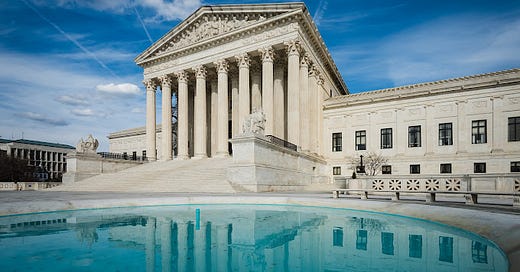US Supreme Court to Hear 14th Amendment Case on 8th February: Trump's Ballot Eligibility at Stake
And Update on Donald Trump's Four Criminal Trials and Two Civil Lawsuits.
Crucial Supreme Court Deliberation on the 14th Amendment
On February 8th, the U.S. Supreme Court is scheduled to hear pivotal oral arguments to determine whether Donald Trump should be disqualified from the Colorado presidential primary ballot under the 14th Amendment. This clause of the US Constitution, instituted after the Civil War, could preclude Trump from the office of the US President for his purported role in the January 6, 2021, Capitol riot if deemed:
(i) an act of insurrection; and
(ii) Trump's behavior prior to the mob's attack is interpreted as active abetment.
Previously, the Colorado Supreme Court determined that Donald Trump's conduct qualified as participation in an insurrection. Currently, as Trump leads in the GOP presidential race, he is urging the Supreme Court to issue a ruling that would clear the path for his eligibility to run for office across the nation. We had discussed the scope and ambit this legal provision in our previous article.
Awaiting Appeals Court Decision on Presidential Immunity
The legal world is also on edge for the appeals court's verdict on Trump's claim of immunity from prosecution for his presidential actions. This decision, still pending nearly four weeks after the D.C. federal appeals court's hearing, could significantly impact the federal election-obstruction case against Trump. In the meantime, this case remains on hold, and the original trial date has been vacated, on account of the pending appeal.
Financial Fraud Case in New York
A verdict is anticipated from Judge Arthur Engoron in a civil lawsuit in New York, where Donald Trump is accused of overvaluing his properties. The Attorney General of New York has suggested a penalty of $370 million. Although the case won't result in jail time for anyone, as it is a civil matter, significant financial penalties and the potential revocation of business licenses in New York State are at stake.
Recap of Trump's Criminal Cases
D.C. Federal Case: Delayed trial concerning the 2020 election results obstruction, with no new date set, as outcome of the appeal on the issue of presidential immunity is awaited.
Georgia State Case: In Georgia's 2020 election case, Trump is charged with 13 counts related to attempts to overturn the state's election results, with four of his 18 co-defendants already pleading guilty. No trial date has been set. The case has been overshadowed by allegations regarding Fulton County District Attorney Fani T. Willis's personal relationship with the prosecutor Nathan Wade, she hired. Willis admits to a personal relationship with Wade but refutes claims it influenced the case, labeling such accusations as "meritless." Allegations surfaced that Willis benefited financially from hiring Wade, who reportedly paid for her vacations, a claim she denies. These allegations came to light amid Wade's divorce proceedings, though Willis asserts the relationship began after Wade was hired in 2022.
Florida Federal Case: In the Florida federal case, Donald Trump is charged with 40 counts for allegedly retaining top-secret documents at Mar-a-Lago and obstructing their return. The trial is set for May 20, with a crucial scheduling hearing on March 1. Prosecutors dispute Trump's claims that the charges were fabricated by "deep state" actors and Biden administration officials. A recent court filing rebuts Trump's assertion of a hidden political agenda behind his indictment and clarifies a misunderstanding about Trump possessing a "Q" security clearance due to a clerical error at the Energy Department, which did not equate to actual clearance post-presidency.
New York State Case: In the New York state hush money case, Donald Trump faces 34 charges related to a 2016 payment. The trial is set for March 25, becoming potentially the first to proceed among his four criminal cases after delays in others. Legal analysts previously viewed this case as the weakest, but a scheduling review is due on February 15.
Civil vs. Criminal Trials
Earlier in a civil trial, Donald Trump was found liable for assaulting and defaming E. Jean Carroll, leading to an order for him to pay over $83 million in both compensatory and punitive damages. Civil trials assess the likelihood of allegations being true based on a "preponderance of the evidence," essentially a greater than 50% probability. In contrast, criminal trials require proof "beyond a reasonable doubt" for convictions, which can result in prison time or mandatory registration as a sex offender, unlike civil cases that typically conclude with financial restitution.
Looking Ahead: The Legal and Political Landscape
The upcoming Supreme Court ruling on the 14th Amendment will clarify Trump's candidacy status amidst the Republican Party primaries. Additionally, the decision from the D.C. Federal Appeals Court on presidential immunity could further shape the legal challenges Trump faces, potentially bringing the January 6 Capitol storming case to the Supreme Court. Meanwhile, the New York State hush money case, set for trial on March 25, stands apart as it pertains to actions before Trump's presidency and is unaffected by the Supreme Court's future decisions. As the campaign trail heats up, these developments signal intriguing times ahead in the intersection of law and politics.





